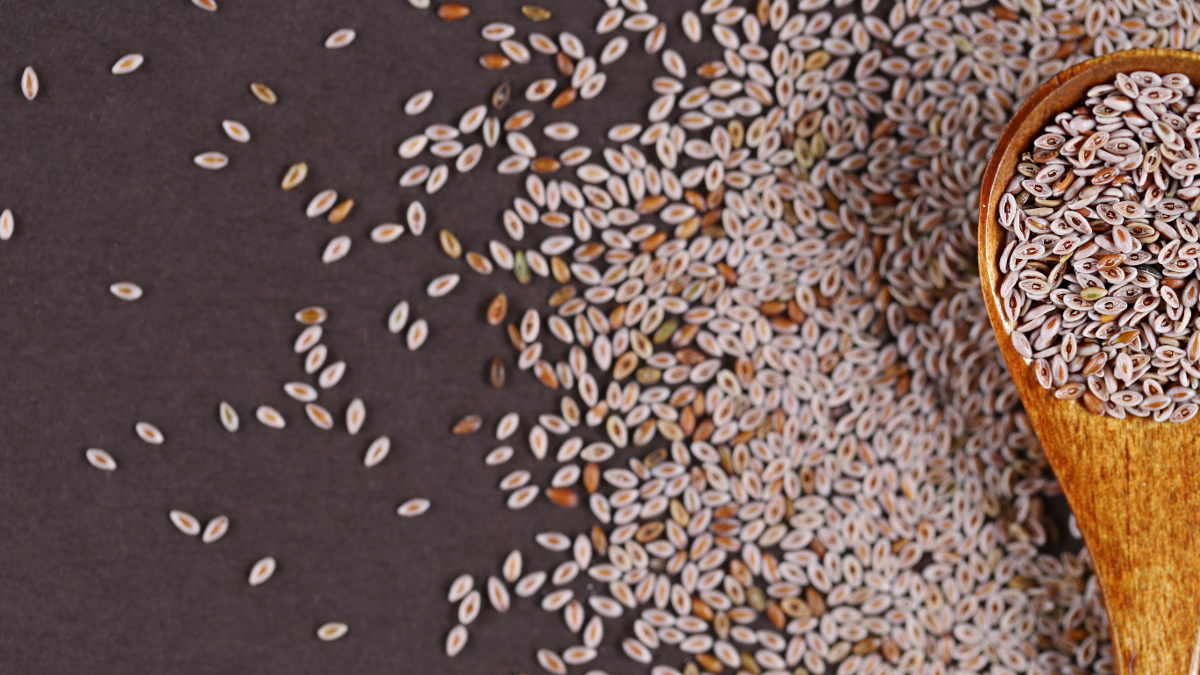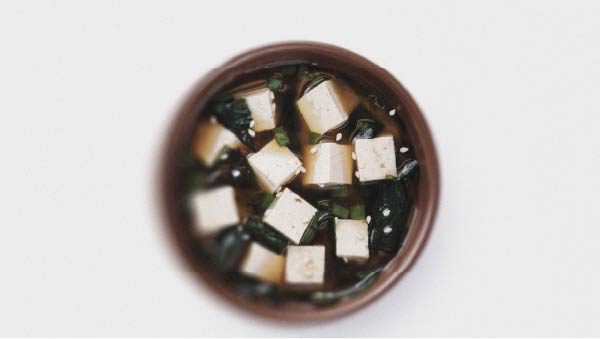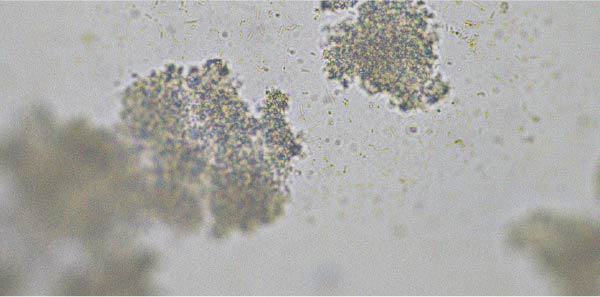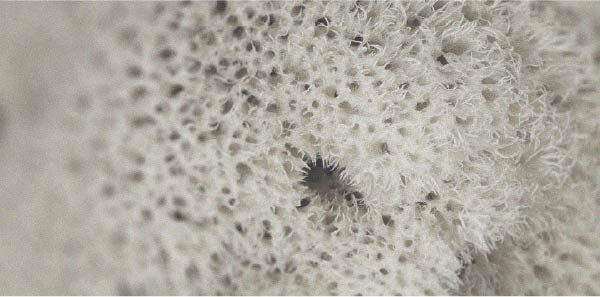Digestive health: the multiple benefits of psyllium
Psyllium seed is recognized as having a beneficial effect on the gut, easing both constipation and diarrhea. Follow our advice to get the maximum benefit from the properties of blond or brown psyllium.

What exactly is psyllium?
The plant Psyllium, also known as ispaghula or Desert Indianwheat, belongs to the Plantaginaceae family. In India, it is known as ‘horse’s ear’ due to its distinctive shape .
It is primarily grown for the pharmacological properties of its seeds, but also for use by the agro-food industry (1).
Psyllium: what’s the difference between the blond and brown forms?
Blond psyllium comes from the Plantago Ovata variety, while the brown form (also called ‘red’ or ‘black’) is obtained from Plantago Afra (2).
Blond psyllium has the advantage of having a greater fibre content (30%) than brown psyllium (10%-12 %).
The benefits of psyllium, an excellent transit regulator
Psyllium seems to be particularly effective at helping to regulate gastrointestinal transit. Psyllium seed and its husk (external covering) contains mucilage, a form of viscous soluble fibre which absorbs and retains water from food.
A natural laxative for constipation
By absorbing water in the gut, psyllium fibre helps to soften and facilitate the elimination of stools in the case of constipation. It thus helps speed up GI transit time(3-4).
Some studies even suggest that psyllium is more effective than certain medications (5). Compared with some laxatives, it also produces fewer unpleasant side-effects such as flatulence and uncomfortable bloating.
The benefits of psyllium seed for alleviating diarrhea
Somewhat surprisingly, psyllium seed is also effective against diarrhea: the fibre actually helps to convert the water in stools into gel, making them firmer. So, whatever your particular problem, psyllium could well help improve your digestive comfort.
Psyllium seed’s other health benefits
Though psyllium is often considered primarily for its benefits on digestion, it also offers hope in other areas. Researchers believe it to be an interesting avenue for the control of cholesterol and triglycerides (6), as well as that of hypertension. (7)
Its potential for improving digestion also makes it a possible aid to weight loss (8).
Which form of psyllium should you take?
For those who regularly suffer from intestinal problems, psyllium is available in the form of a powder or ‘flour’, to be taken with plenty of water. You can, for example, try the excellent supplement Psyllium Husk, composed exclusively of blond psyllium seeds.
References
- Khaliq, R., Tita, O., Antofie, M., & Sava, C. (2015). Les applications industrielles du psyllium : un aperçu, ACTA Universitatis Cibiniensis, 67(1), 210-214.
- Rao, Monica. (2014). Caractérisation des polysaccharides du Psyllium (Plantago ovata) et leurs utilisations. Polysaccharides, 2014.
- Une approche factuelle de la gestion de la constipation chronique en Amérique du Nord, American Journal of Gastroenterology : 2005 - Volume 100 - p S1-S4.
- Ashraf, Park, Lof, and Quigley (1995), Effets de la thérapie au psyllium sur les caractéristiques des selles, le transit du côlon et la fonction anorectale dans la constipation idiopathique chronique. Alimentary Pharmacology & Therapeutics, 9: 639-647.
- McRorie JW, Daggy BP, Morel JG, Diersing PS, Miner PB, Robinson M. Le psyllium est supérieur au docusate sodique pour le traitement de la constipation chronique. Aliment Pharmacol Ther. 1998;12(5):491-497.
- Anderson JW, Allgood LD, Lawrence A, et al. : Effets hypocholestérolémiants de l'apport de psyllium en complément d'un traitement diététique chez les hommes et les femmes souffrant d'hypercholestérolémie: méta-analyse de 8 essais contrôlés. Am J Clin Nutr. 2000;71(2):472-479.
- Cicero AF, Derosa G, Manca M, Bove M, Borghi C, Gaddi AV. Différents effets de la supplémentation alimentaire en psyllium et en guar sur le contrôle de la pression artérielle chez les patients hypertendus en surpoids: un essai clinique randomisé de six mois. Clin Exp Hypertens. 2007;29(6):383-394.
- Verma, Anjali. "Tégument de psyllium (Plantago ovata) : un aliment merveilleux pour une bonne santé." (2015).
Keywords
5 Days
great products and prices
great products and prices
Marie
11 Days
Easy to navigate site
Easy to navigate site, had what I was searching for, good price. easy order-check out
James Tucker
17 Days
My skin is clearing up nicely!
Pretty good for my skin so far.
Christian
19 Days
The new packaging is excellent
The new packaging is excellent - finally! No more squashed boxes and torn envelopes.
GORAN
20 Days
Great Product
Great Product
Larry Garrett
25 Days
Quick shipping
Quick shipping; good price. No issues!
Mary McCarty
26 Days
Thr product is very good and is helping…
Thr product is very good and is helping me on my health. Then is always on time
LUGO Luz
28 Days
Buying was fine
Buying was fine. I had problems with the website not recognizing my login info, and had to call to get it fixed. Other than that, everything was good.
David S. Clark
29 Days
Your super maca and super ginseng are…phenomenal
Your super maca and super ginseng are phenomenal supplements that compliment each other when taking them together. Fantastic feeling of well-being and lots of mid day energy without the crash.
Keith Mason
31 Days
I have had amazing results with every…
I have had amazing results with every supplement I've purchased. I am extremely satisfied with this company
kirstin Torres
32 Days
Fine products
Fine products . They are on the leading edge of online supplements. The only issue -so far-is they sometime run out of subscription items.
Jason Argos
34 Days
The ordering process is very user…
The ordering process is very user friendly and the products always come in a timely manner.
CARTER Rhonda
35 Days
The price for Dr
The price for Dr. Pero's AC-11 is reasonable and in line with his views. (my former colleague). Keep it pure.
CAMPBELL Clayton
38 Days
Right on every time.
Right on every time.
Arthur Nicholas
41 Days
They are cheaper than everyone else and…
They are cheaper than everyone else and the shipping was fast. Great company.
Patricia Adams




